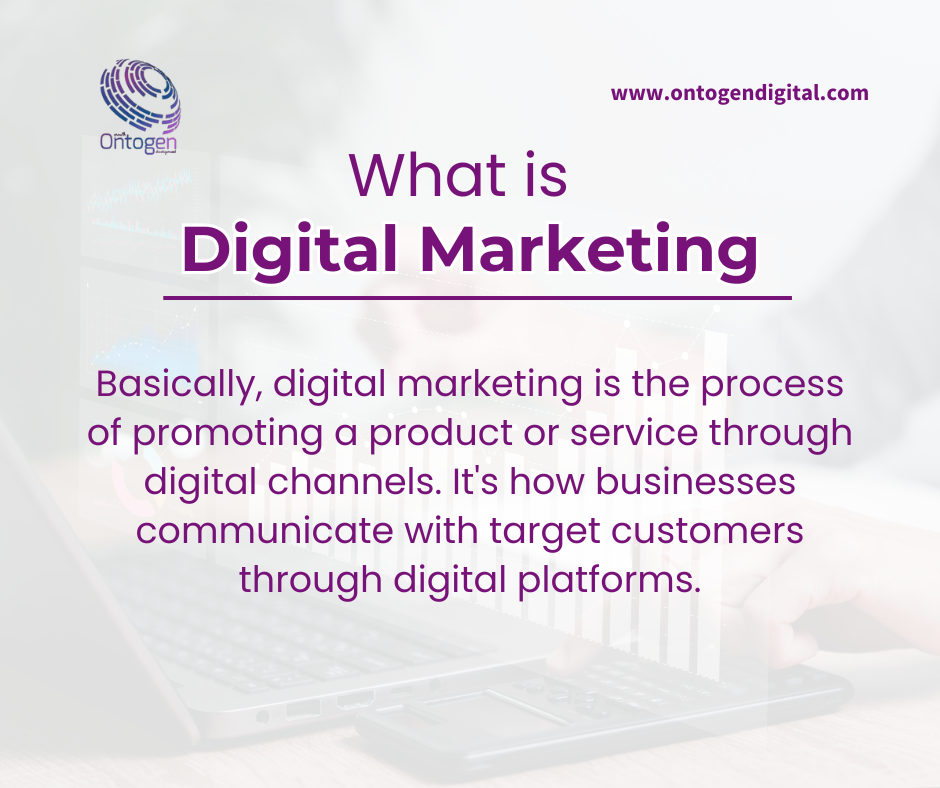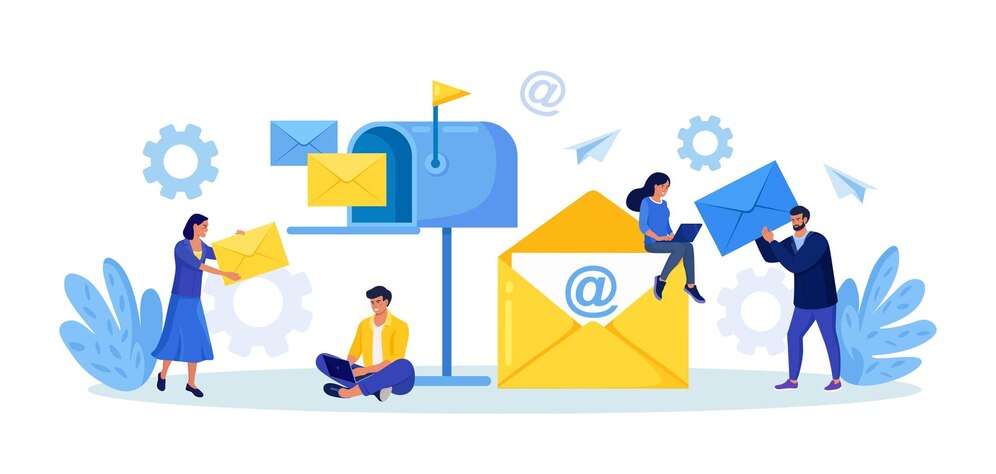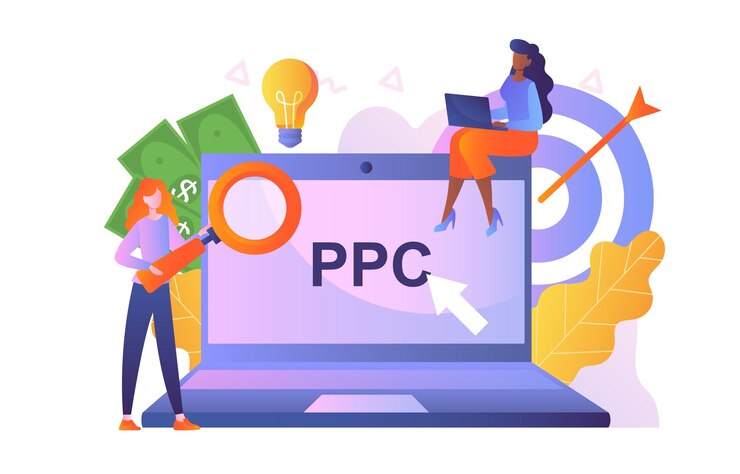17 July 2024 |
By - Sudha Mariappan

What is Digital Marketing?
Have you ever noticed that marketing has changed over the years?
You may have heard the term “Digital Marketing”. In loose terms, it means marketing in this vast digital world. Where smartphones and the internet have turned out to become an inseparable part of our life, it was pretty obvious that some time ago, businesses realized huge potential to be tapped in reaching customers over the internet. This is what digital marketing does.
Basically, digital marketing is the process of promoting a product or service through digital channels. It's how businesses communicate with target customers through the internet, social media, search engines, and other digital platforms. Other than traditional marketing techniques like television or newspaper advertisements, digital marketing allows for more targeted and measurable campaigns.
With over 5.44 billion internet users worldwide, you can imagine the endless scope you have for your business to survive through digital marketing.
Digital marketing has various channels through which you can engage with an audience. There are 7 major types where you can use Digital Marketing:
Affiliate Marketing:

In affiliate marketing, you partner with other businesses or even individuals who become your affiliates and help sell your products. They are then paid based on the number of sales their marketing can generate.
They do this through blogs, social media, or websites. This is the kind of situation that is mutually beneficial, where businesses get more sales, and affiliates obtain cash for their promotional efforts.
Email Marketing:

Email marketing involves sending highly personalized emails to subscribers on your list. It can be used to promote products, convey any upcoming news of your brand, or even nurture leads. Effective email marketing would involve creating a relevant email list and sending personalized messages.
Suppose you run an e-commerce clothing store; you can send emails on new arrivals, special discounts, or even personalized recommendations based on earlier purchases.
Read Also: Top 7 Email Marketing Strategies to Improve Your Sales
Marketing Analytics:
Marketing analytics refers to measuring, managing, and analyzing marketing performance for its maximization of effect. This way, businesses can know customer behavior, track performances of campaigns, and undertake informed decisions with the help of data and analytics tools.
For example, Google Analytics helps track website traffic, user behaviors, and conversion rates, all to an understanding of what works and what does not.
Mobile marketing is of equal importance with the present trend of extended smartphone usage. It would include search engine optimization of your website for mobile, making mobile applications, and SMS marketing.
Mobile marketing will let your business be available to people on the move. For example, a restaurant can let its customers know about the daily specials or discount offers through SMS.
Pay-Per-Click (PPC):

PPC stands for pay-per-click. It is a form of online advertisement whereby an advertiser pays each time a user clicks their ad. Typically, it should be done via Google Ads.
Advertisers bid on certain keywords describing their products and services, after which their ad appears either on the results page of any search engine or on websites. PPC can help drive traffic to your site fast enough, but it requires good management to bring back value in investments.
With AI coming up, the world of online advertising is changing fast. Costs for ads are going up, and people are spending their time differently online.
Recently PPC changes that happened in 2024:
- How to use new AI tools for better ads without getting into trouble.
- How to spend your ad money wisely even when costs are rising.
- Where to find new customers online and what to focus on.
Using PPC, this is a great time to try new things in advertising. If you can adapt to these changes quickly, you can get a big advantage over your competitors.
SEO is the art of optimizing your website for top search engine rankings. You want your website on top, whether people are searching for products or services related to your business.
This comes through proper keyword usage, quality content, and backlinking.
For example, if you have a pizza outlet in Mumbai, you would want your website to come at the top when someone searches for terms like "best pizza in Mumbai" or "pizza delivery in Mumbai."
Search Engine Marketing (SEM):

SEM simply means that you appear in search through paid advertising. Most of the time, this will be through websites such as Google Ads. You bid on the keywords, and these ads pop up when people are searching for those keywords.
SEM is almost immediate exposure, but it requires constant budgeting and management. This ensures significant traffic to your website while complementing your SEO efforts.
SEM Trends for 2024:
- Economic uncertainty and increased competition will make it harder to maintain SEM efficiency.
- Google's push towards automation will reduce advertiser control and change the way keywords are used.
- Understanding and utilizing audience segments will be crucial for successful SEM campaigns.
Social Media Marketing:

Each one of us is familiar with social media marketing. The ads we see displayed on different social media platforms influence us in many ways. The ability of social media platforms, including Facebook, Instagram, Twitter, and LinkedIn, is unlimited in reaching audiences.
It may be anything from creation, sharing, and engagement of content, interaction with followers, running advertisements, building community, and lots more done under the umbrella term of Social Media Marketing.
Read Also: How do digital marketing agencies work? What are some initial steps to know before hiring a digital marketing agency?
Why is Digital Marketing Important?
Wider Reach: The sheer number of billions that log on to the internet is what digital marketing helps you reach, as opposed to traditional methods. For example, a local bakery will use social media to attract customers from across a city, rather than relying solely on word-of-mouth or foot traffic.
Cost-Effective: Compared with other conventional modes of advertising, digital marketing is less expensive most of the time. Any business, regardless of size, can afford it. A Facebook ad campaign may cost less yet be better targeted than placing a similar ad in a national newspaper.
Measurable results: Get real-time performance for campaigns in order to drive data-driven decisions. Tools such as Google Analytics and social media insights will let you know how your campaigns are improving, what's working and where improvements are needed.
Targeted Audience: Place along with tools like analytics can enable contacts with perfect customers to be made. Suppose you are dealing in sports equipment, you can direct your advertisements to people interested in sports and fitness.
Better Customer Engagement: Digital platforms offer interactive ways to engage audiences and build relationships. For example: A beauty brand may do demos of their makeup, respond to customers' questions, and get feedback from customers using Instagram stories.
Digital Marketing is a powerful tool that offers various benefits for your business over traditional marketing tools. If you want to stay ahead in the online market and achieve long term success, these strategies will help you get your business to new heights.
As a leading digital marketing agency, we strive to be better for our clients. Our services of digital marketing includes SEO, SEM, PPC, Animation, Graphic Design and Content writing. If you want to avail any services, connect with us at info@ontogendigital.com. Subscribe to us for more blogs.
KEY TAKEAWAYS:
- Digital marketing is a process of promotion of products and services using digital media, which allows only targeted and measurable campaigns unlike the traditional methods.
- In turn, the seven key elements of digital marketing are: Affiliate marketing, Email marketing, Marketing analytics, Mobile marketing, PPC, SEO, and SEM.
- The use of platforms such as Facebook and Instagram to communicate and reach a large audience is a major form of Digital Marketing.
- It is cost-effective, has a far greater reach, provides measurable results, targets specific audiences, and helps in customer engagement.
- Staying ahead of trends, such as using AI within your PPC and SEM, is crucial to staying competitive in today's digital environment.